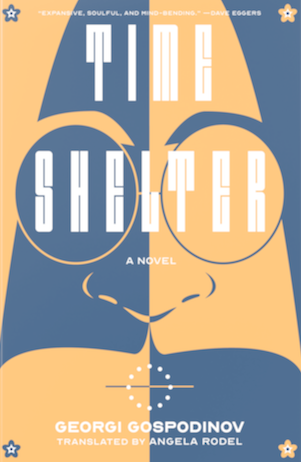
Time shelter
Liveright, 2022
304 p.
ISBN: 978-1-324-09095-3
This year the winner of the International Booker Prize has been the Bulgarian author, Georgi Gospodinov with his wonderful novel Time Shelter.
The plot of the book begins with a project that tries to alleviate people suffering from Alzheimer’s or dementia: a house where each room is set (down to the smallest detail) in another decade. But over time, the need to live in the past, the nostalgia for other times, leads healthy people to take refuge in those spaces for longer and longer. Until we reach a moment when all countries will relive a historical era chosen in a referendum. A collective madness? Fear of the uncertain future? A wish to go back to the “traditional”? Is it something visionary or dangerous? This is a deliciously complex fragmented novel, where melancholy is mixed with meta-literary, political and philosophical themes. To savor each phrase.
I believe it to be difficult to write something that is both fun and scary, ambitious and nostalgic, something that so faithfully reflects the atmosphere of the countries on the other side of the Iron Curtain. I don’t think it’s an easy read, but it’s certainly worth delving into this story, so original and so timely in many aspects.
On December, 11th at Donostia Book Club we will analyze the motifs that appear in the novel and try to unravel the most complex parts of it. In case you would like to do the same, join us and/or think about these questions (suggested on The Booker Prize website):
- The book’s central character, Gaustine, who comes
up with the idea of the clinics of the past, is a
mysterious, enigmatic and charismatic figure,
and the narrator often struggles to understand
him. ‘I was never sure when he was joking or
whether he joked around at all.’ (page 44).
To begin with, he seems to be a visionary, providing
a radical and successful form of therapy. Later
in the book, the narrator calls him a ‘monster’.
Did you find Gaustine a likeable character or
a dangerous and malevolent figure, or both?
- When interviewed for the Booker Prizes website,
Georgi Gospodinov said his career had been
inspired by ‘[my] grandmother’s stories that I
listened to as a child. Stories that blended
fiction and reality, with no clear end to one
and beginning to another. Stories that had
voices and whispers, and miracles at the end.’
Can you see these influences in Time Shelter?
- At several points in the book, the narrator, who
is an author, mentions that he invented or
dreamt up Gaustine. He calls Gaustine his
‘invisible friend, more real and visible than
my very self’. Both narrator and Gaustine
share the initials G.G. and are Bulgarian
(like Georgi Gospodinov). To what extent
are the two main characters and the book’s
author all the same person? Did you find
the book’s metafictive elements successful?
- The novel can be read as an increasingly
outlandish satire about modern society’s
idealisation of the past and the dangers
of such an outlook when on a mass scale.
It’s a timely read, one which the Guardian
said addresses the ‘weaponisation of
nostalgia’. Would you agree that we live in
an age where nostalgia has been weaponised?
- The panel of International Booker Prize judges
called the book ‘morbidly humorous’. How does
the author’s use of humour and irony
contribute to the book as a whole?
- At one point during the story, Gaustine retreats
to the year 1939, which is referenced at the
beginning of the book as ‘the end of human
time’. The ending of the book also leans into
this moment. Why does Gospodinov keep
circling back to this date?
|

